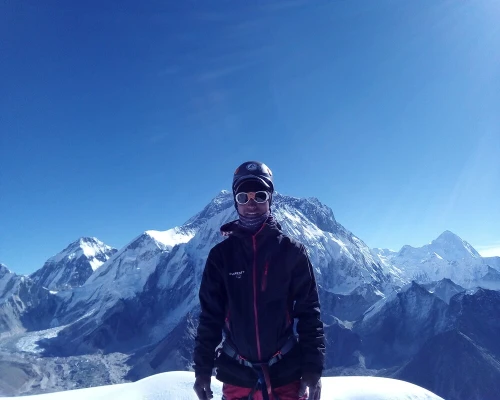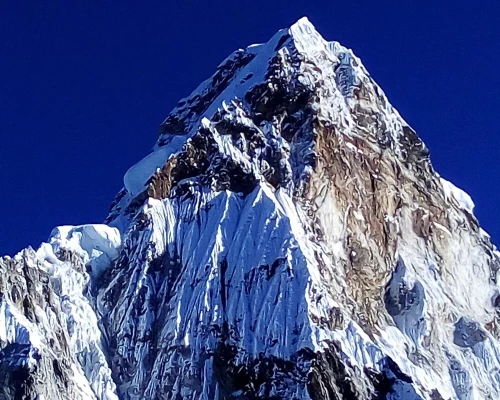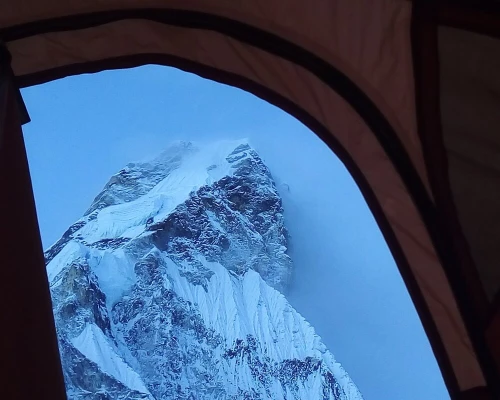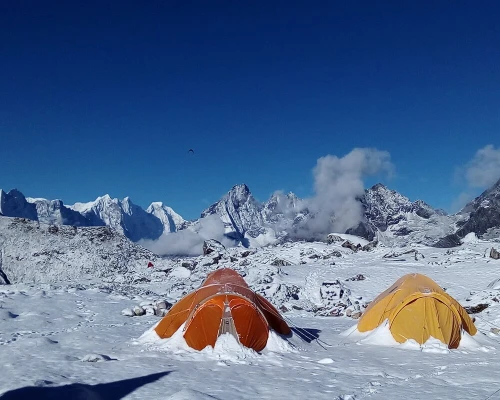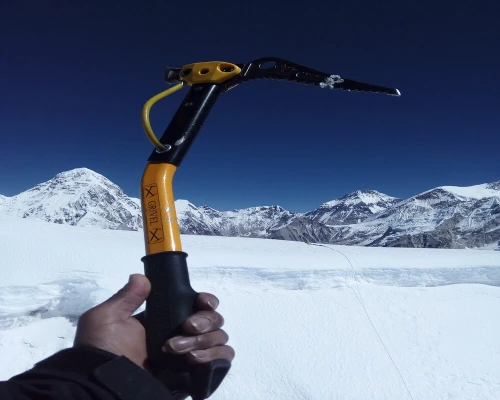Everest Three Peaks Challenge, famously known as the Three Peaks Expedition, is one of the demanding high altitude adventures in Nepal's Everest region. This expedition covers the ascent of three trekking peaks, Lobuche East (6,119 m), Pokalde Peak (5,806 m), and Island Peak (6,189 m), along with crossing three high passes in Everest: Renjo La Pass (5,415 m), Cho La Pass (5,300 m), and Kongma La Pass (5,535 m), not missing the hike to Gokyo Ri (5,357 m). On this journey, there will be grand views of the Everest range, with increasing altitude and technical natures of the challenges.
Lobuche East is a technical peak to climb; it requires ropes, crampons, and ice axes. Climbers usually set up a high camp near the summit ridge and then make the final ascent over steep snow and ice. The summit affords magnificent views of Everest, Lhotse, and Nuptse. Pokalde Peak, is the first to be attempted among others and less technically difficult; it, however, involves previous trekking experience, as well as experience with climbing equipment. Climbers begin their accent at a base camp near the Kongma La Pass, enjoying panoramic views from Makalu, Ama Dablam, and the Everest region. Though the climb is not technically difficult, the altitude is a major challenge. Island Peak, the final and most technical of the three at 6,189 m, has fixed ropes that will be used, along with crampons and ice axes, while negotiating sections of glacier. It is a combination of rock scrambling combined with snow and ice traverses, offering spectacular views of Lhotse, Ama Dablam, and other towering peaks of the Himalaya.
Three Peaks Expedition begins with an exhilarating flight from Kathmandu to Lukla, then proceeds with an epic trek via iconic Sherpa villages at Namche Bazaar, Thame, and Lungden, respectively, at 3,440 meters, 3,820 meters, and 4,500 meters. Climbers then proceed upward to 5,415-meter Renjo La Pass, with rewarding views of Everest, Lhotse, Makalu, and the Gokyo Lakes. It goes further to Gokyo Lake and culmination of climbing Gokyo Ri at 5,357 meters, which is a popular viewpoint that has a panorama of the peaks and lakes surrounding it.
Continuing with the challenging cross of the Cho La at 5,300 meters to Thaknag 4,690 m, Dzongla 4,710 m, and Lobuche. From here, a trek to Gorak Shep at 5,160 meters, then to Everest Base Camp-EBC at 5,364 meters and Kala Patthar at 5,554 meters, famous for their iconic views of Mount Everest, among other things.
It is from this day onward, after acclimatization during this initial phase of the itinerary, that the climb to initiate all three popular peaks in the Everest region starts. This stage of the itinerary involves traversing different Base Camps and High Camps before reaching to the summit. The expedition demands proper acclimatization for being successful, and the itinerary includes multiple stops so that climbers will get used to the high altitude, your are better prepared for this demanding physical and technical adventure.
Three Peaks Expedition offers beautiful 6,000 m peaks Lobuche, Pokalde, and Island Peak perfect for skill development in mountaineering.
- Stand on three magnificent peaks in the Everest region for an unparalleled thrill.
- Enjoy the fragrant wilderness as you traverse this rich trail.
- Take a challenge of crossing three incredible high passes in the Khumbu Himalayas.
- Unforgettable moments of mountaineering and trekking,
- Getting closer to the Himalayan wildlife.
- The dream destination of many travelers comes true while exploring Gokyo Ri, Everest Base Camp, and Kala Patthar.
- Appreciate breathtaking landscapes, mountains, valleys, and glaciers.
What makes the journey special to climb Everest Three Peaks?
The range of stunning landscapes includes dramatic mountain ranges, deep valleys, and pristine glacial lakes. Spectacular panorama views from different pass heights offer heart-stopping views of iconic peaks: Everest, Lhotse, Makalu, and Ama Dablam. There are three popular trekking peaks to climb that include Lobuche East, Pokalde, and Island Peak, each with its unique challenges and technical skills. Such variations afford the climber the opportunity to build up his mountaineering skills while enjoying the real thrill of high-altitude adventure.
This trek circles the settlements of pulsating Sherpa villages, such as Namche Bazaar, Thame, and Lungden, which are the epitome of cultural experience to any climber desiring to interact with the locals and visit monasteries to understand Sherpa customs. Additionally, varieties of Himalayan wildlife include rare native species like snow leopards and Himalayan tahr, which afford great views of these wild animals in their natural surroundings.
It consists of several acclimatization stops en route, such as Gokyo Lake and the Renjo, Chola, and Kongma La passes, with about 7-9 hours of walking daily. The above-mentioned structuredness thus allows for a slow acclimatization to high altitudes, extended to Kala Patthar and Everest Base Camp, hence lowering the chances of developing altitude sickness and improving the overall safety and success of the expedition. These are contributory difficulties to shared challenges in climbing. This fact itself strongly bonds participants, as support and encouragement from fellow climbers create camaraderie, enhancing the journey and often leading to lifetime friendships. Peaking and the summing up of an expedition release an overwhelming sense of satisfaction since the combination of physical effort, mental toughness, and beautiful scenery all combine into an experience that climbers will not ever forget. After all, it is not only about attaining the summits but also about seeing new terrains and overcoming obstacles while appreciating the beauty of the Everest region. Every day brought with it different challenges, providing fresh opportunities for personal growth and adventure.
Invaluable Sherpa culture, natural beauty of Khumbu, especially Gokyo Ri
Natural wonders abound within the Everest Region with breathtaking landscapes that overwhelm the senses. Next to be mentioned is Gokyo Ri, one prominent peak offering a spectacular panoramic view in the Himalayas. Perched at an altitude of around 5,357 meters, Gokyo Ri offers brilliant vistas from the peaks that surround it: Everest, Lhotse, Makalu, and below are glittering Gokyo Lakes. Gokyo Ri is an uphill trek that winds gradually through picture postcard landscapes, lush valleys, and turquoise glacial lakes reflecting striking colors of the sky.
The Gokyo Lakes themselves are a series of six beautiful glacial lakes regarded as some of the highest-altitude lakes in the world. The bright blue and green colors of this contrast nicely with the stark white of the snow-capped peaks surrounding them. Not only are these lakes breathtakingly beautiful, but they also holding strong cultural significance to the Sherpa people, who consider them to be sacred.
Immerse in the enriching Sherpa culture and gaze in astonishment at the natural wonder of the Everest region. Gokyo Ri allows one to witness and appreciate the beauty of the Himalayas while gaining insight into the deep traditions and ways of living among the Sherpas, making the journey truly unforgettable adventure.
An adrenaline filled ascent to Gokyo Ri, Everest Base Camp (EBC), Kala Patthar.
The three peaks of Everest carry the climber on an exciting journey to some of the most unbelievable sceneries in the world. Each destination offers its own problems and rewards, making the adventure unforgettable for those in pursuit of the most magnificent high-altitude experience. The trek to Gokyo Ri starts in the scenic Gokyo Valley and is well-recognized for its fabulous glacial lakes. The summit of Gokyo Ri lies at 5,357 meters (17,575 feet), with steep inclines constituting a pretty steep climb, and good physical fitness is required, together with acclimatization. Stunning views greet the climber as he advances upwards, against towering peaks with bright blue and green Gokyo Lakes. It is indeed an exhilarating feeling on the summit of Gokyo Ri, offering a panoramic view into the heart of some of the world's highest peaks: Everest, Lhotse, and Makalu. It is an accomplishment in itself that together with the breathtaking scenery turns this trip upward into a highlight.
After Gokyo Ri, the climbers take to Everest Base Camp, which lies 5,364 meters above sea level. A trek to EBC is considered iconic because it follows the winding, very charming Sherpa villages, ancient monasteries, and lush landscapes. The trek to EBC involves crossing the challenging Khumbu Glacier through rock and ice. The natural emotional euphoria and a sense of reverence overcome the climbers upon arrival at base camp, the base of the world's tiniest peak. The atmosphere is electric, and the very air reverberates with adventure and aspirations of every climber across the globe.
For the ultimate view of Mount Everest, one must undertake a climb to the top of Kala Patthar at 5,545 meters (18,192 feet). The fairly short but steep climb to the summit starts very early in the morning, usually when it is still dark outside, to view the great sunrise over Everest-a really magical experience. By these standards, the views from Kala Patthar are nothing short of breathtaking, with Everest towering majestically alongside peaks like Pumori and Nuptse. Standing from this viewpoint and being surrounded by mighty Himalayas is something that could never be erased from one's memory.
Everest Three Peaks, Lobuche East, 6,119 meters or 20,075 feet, offers great views from the summit of Everest and surrounding peaks. Pokalde is less technical at 5,806 meters or 19,344 feet and is a good peak to gain experience on. Island Peak at 6,189 meters or 20,305 feet offers a popular challenging ascent with great views. Each of these peaks has a different requirement for technical acumen and thus provides a unique possibility for climbers to develop a broad range of mountaineering competencies while having the experience of climbing at very high altitudes.
Experience the stunning high passes of Gokyo and the iconic Khumbu Valley on an unforgettable lifetime adventure.
During the Lobuche Peak, Pokalde Peak, and Island Peak climbing, trekkers and climbers enter the Gokyo Valley, situated to the west of the Khumbu Valley and separated by the Chola Pass in the Solukhumbu district of Nepal, within the Sagarmatha National Park a UNESCO World Heritage Site. This region sees a similar volume of expeditions throughout the year compared to the Khumbu Valley, which is part of the classic Himalayan route for longer treks, such as the Everest Base Camp and the Gokyo Lakes Trek with Three High Passes.
Your journey begins with the ascent to Renjola Pass, a stunning viewpoint that offers panoramic vistas of the surrounding peaks and valleys. As you traverse this high pass, you’ll encounter dramatic landscapes and the serene beauty of the Himalayas, making it an ideal introduction to the wonders of this region. After descending from Renjola Pass, you will enter the Gokyo Valley, famous for its striking glacial lakes that exhibit vibrant shades of blue and green. This valley is surrounded by towering, snow-capped peaks, providing a breathtaking backdrop as you explore the area. Your trek continues to Gokyo Ri, where the ascent rewards you with some of the most spectacular views in the Himalayas. From this vantage point, you can admire the majestic peaks of Everest, Lhotse, and Makalu, alongside the shimmering Gokyo Lakes below.
Next, you will navigate the Chola Pass, another remarkable high pass that presents both a challenge and an opportunity for breathtaking views. As you cross this pass, the rugged terrain and stunning vistas will captivate you with the natural beauty that surrounds you. The trek then leads to Kala Patthar, a must-visit destination for anyone wanting to witness the grandeur of Mount Everest up close. The early morning ascent to this viewpoint is particularly rewarding, as you experience the sun rising over Everest, illuminating the mountain in a golden hue. The panoramic views from Kala Patthar create a breathtaking backdrop for photographs and memories that will last a lifetime.
Continuing your adventure, you will trek to Everest Base Camp, where you can also ascend to Kala Patthar for a wide array of mountain views. This base camp is the ultimate destination for climbers and trekkers alike, offering a unique atmosphere at the foot of the world’s highest peak, surrounded by the hustle and bustle of climbers preparing for their ascents. The base camp embodies the spirit of adventure and serves as a place of dreams and aspirations.
Finally, your journey takes you across Kongma La, the last of the high passes on this epic trek. This pass offers stunning views and a sense of accomplishment as you complete the circuit of the Everest region's iconic passes. Both valleys are adorned with serene turquoise glacial lakes, including Gokyo Lakes, Ngozumpa Glacier, Khumbu Glacier, and Imjatse, enhancing the scenic charm of the trek. Lush forests of rhododendron, pine, and juniper provide colorful contrast to the towering peaks above, creating dramatic backdrops that showcase the untouched natural beauty of the Everest region.
28 Day Itinerary, Trekking Route and Cost for Everest Three Peaks Climbing
The adventure of Everest Three Peaks Climbing is elaborated with a day by day, 28 day itinerary for the best possible acclimatization, safety, and enjoyment. Climbers start their journey in Kathmandu upon arrival at Tribhuvan International Airport, where they are welcomed into their hotels. The rest day for climbers is scheduled to be followed by an extended discussion with guides over itinerary, safety procedures, and detailed preparation on the next day. From here, you take an early morning flight to Lukla, which ushers them into the commencement of the trekking and climbing adventure. On the first day of the trek, there is a hike from Lukla to Phakding. The following day, it goes uphill to Namche Bazaar, a well-liked Sherpa town. Because of acclimatization reasons, climbers have to spend an extra day in Namche for the purpose of exploring the area and getting adjusted to the altitude. It moves further to Lungden, a city with a beautiful monastery, and then to Thamo, where one more acclimatization day is spent to get accustomed to the high altitude. From Lungden onwards, the climbers make their way to Gokyo via the crossing of Renjola Pass, Chola Pass, and Kongma La Pass with spectacular views of Ngozumpa Glacier and Khumbu Glacier along the way.
The main events of the schedule include the trek to Gokyo Lake and Everest Base Camp, from where climbers relish the atmosphere at the foot of the highest peak in the world. Respectively from Gokyo and Gorak Shep, the trekkers make their way up in early morning for Gokyo Ri and Kala Patthar to watch the striking sunrise view of Everest and its surrounding peaks. From here, it meanders back down to Namche Bazaar and down to Phakding, whence trekkers fly back to Kathmandu to rest and prepare for the upcoming peak climbs. The second half of the itinerary involves summiting all three peaks: Island Peak, Lobuche East, and Pokalde. Upon return from Everest Base Camp and Kala Patthar, the trekkers head towards Lobuche Peak Base Camp for preparation of the ascend. Climbing Lobuche Peak offers spectacular views of the surrounding Himalayas with rewarding experience, followed by a descent back to Lobuche. After summiting Lobuche East, the trekkers continue to Kongma La Pass for the final ascent to Pokalde Peak. Continuing the trek to Chhukung and Island Peak Base Camp will bring them up to the final climb to Island Peak and back to Lukla for a flight to Kathmandu, where one can celebrate accomplishments.
Prices for an Everest Three Peaks Climbing Adventure vary greatly, depending on the quality of service, and which itinerary taken. For a general full-service package, including permits, experience guides, accommodation, meals, and transportation, climbers can expect to pay anything between $7,500 and $9,500. Pre-trek essentials such as the Sagarmatha National Park entry permit and the TIMS card, popularly known as the Trekkers' Information Management System card, required for Everest region trekking. The opportunity to hire professional guides and porters, therefore enhancing the chances of being able to enjoy each and every moment of the trek and make safe climbs. This includes the fee that they charge in their packages. Similarly, during this climb, tea house accommodation and food expenses are also catered for, thus allowing the climbers to enjoy the local cuisine in comfortable lodging. Most of the packages cover flights between Kathmandu to Lukla and vice-versa, hence being quite comprehensive for this adventure.



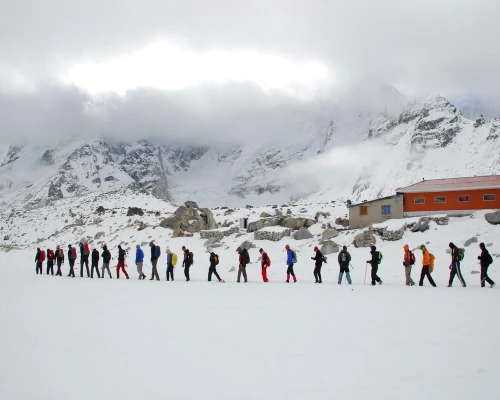
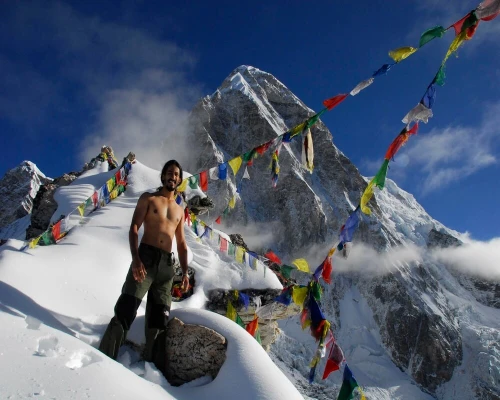
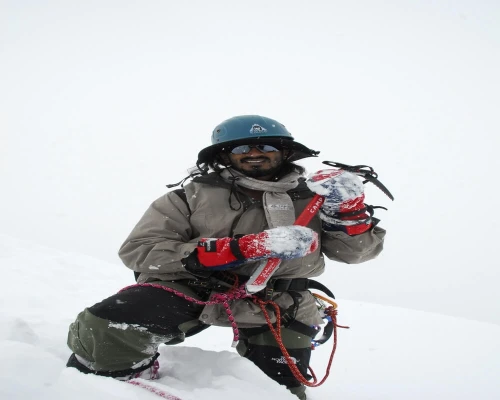
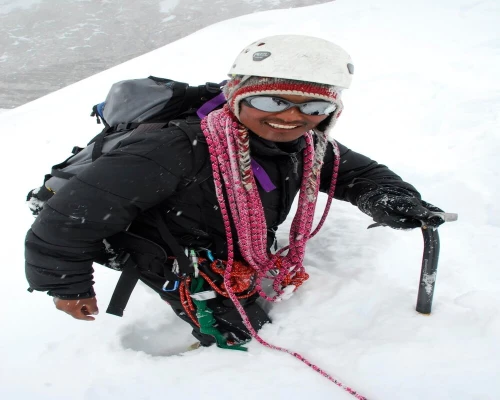
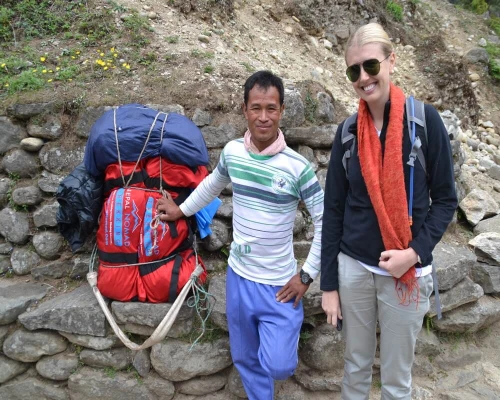
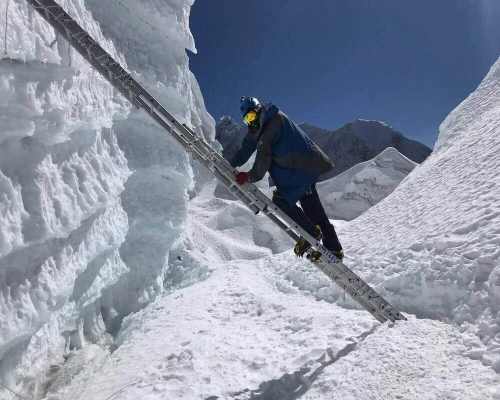
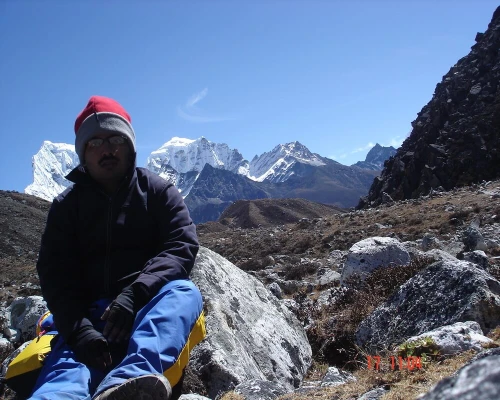
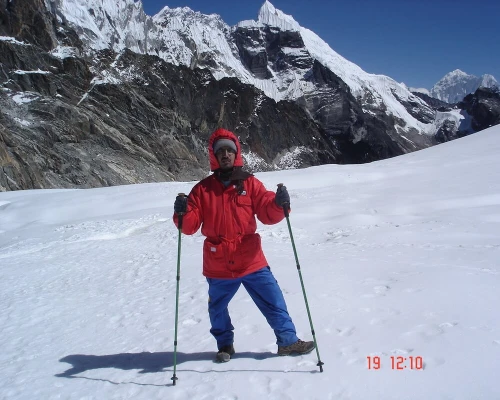
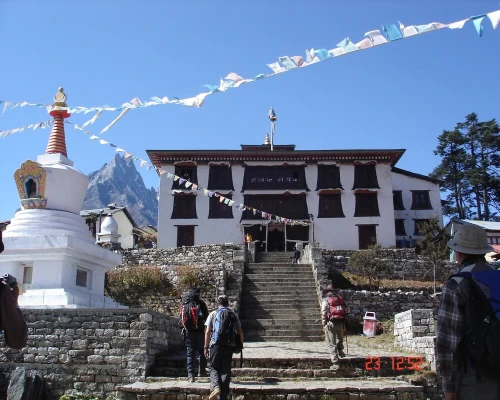
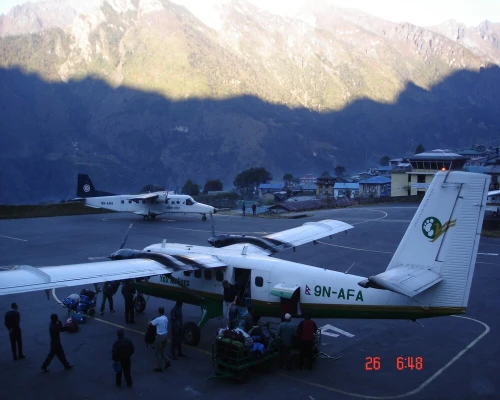
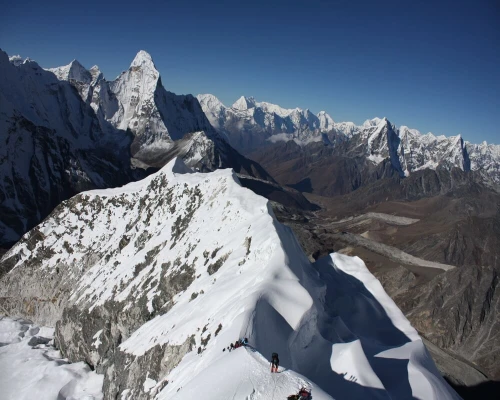
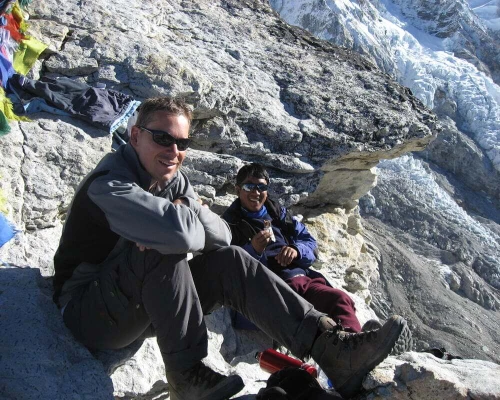
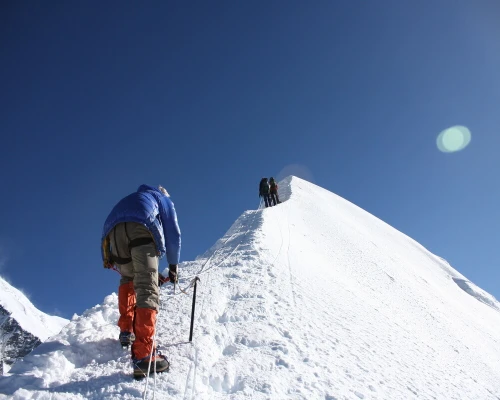
![Img []](https://media.nepalnomad.com/uploads/package/gallery/thumb/img-1582[1].webp)
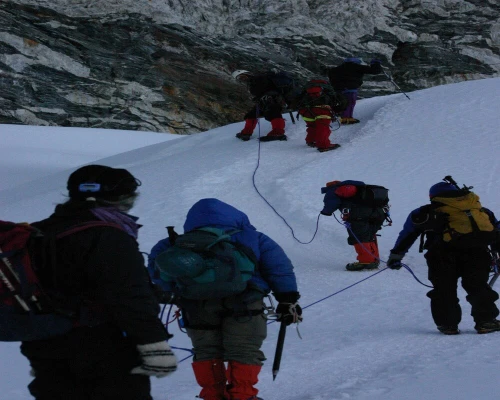
![Img []](https://media.nepalnomad.com/uploads/package/gallery/thumb/img-1597[1].webp)
